Coronavirus: London transport 'will shut without second bailout'
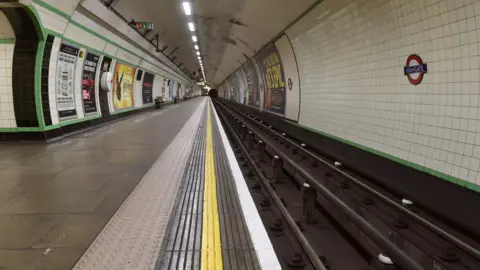 BBC
BBCLondon's transport network will shut down in a "doomsday scenario" without a second bailout, Transport for London (TfL) has warned.
The government agreed to a £1.6bn bailout in May, to keep services running after TfL's income fell by 90% during the coronavirus pandemic.
The deal is due to expire in two weeks.
TfL bosses say £2bn is needed to run services until December, but a row has broken out between the prime minister and London's mayor over funding.
Speaking to BBC London, Boris Johnson said any future deal would be reliant on Sadiq Khan "taking some steps to show more prudence in how he handles his money".
He said his successor as mayor "must cut his coat to suit his cloth".
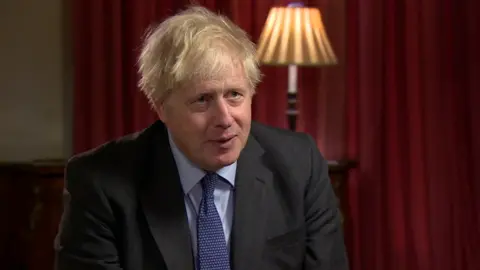
"I'm sad to say the current mayor of London blew the finances of TfL with an irresponsible fare package," he said.
"This government will do what we can to support Londoners and keep the city moving."
In response, a spokeswoman for the Mayor of London described this comment as "extraordinarily disingenuous".
"The sole cause of TfL's current financial difficulties is this virus - which has led to huge financial losses for public transport authorities around the world as passenger numbers have collapsed," she said.
The spokeswoman added before the pandemic, Mr Khan had reduced TfL's operating deficit by 71% and that cash reserves had increased by 13%, meaning TfL had more than £2bn in reserves when the pandemic hit.
'Grind to a halt'
The government has promised a letter setting out terms for a fresh bailout.
TfL Commissioner Andy Byford said finances were "right on the wire".
The transport authority wants almost £3bn to stay afloat through 2021, according to the Local Democracy Report Service.
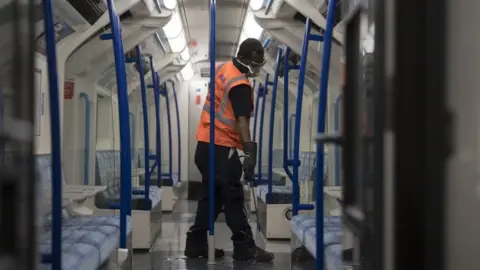 EPA
EPAWithout government cash, the network would be forced to issue a Section 114 order - the equivalent of bankruptcy for a public company.
This "doomsday scenario" would mean "absolute shut down" with TfL only allowed to run services it had to provide by statute dating back to the 1800s.
Due to a 200-year-old law, the Woolwich Ferry - which links Woolwich and North Woolwich - is the only commuter service TfL is legally obliged to run.
Buses for children who live more than two miles from school would also continue to run.
TfL would also carry out limited road repairs and license taxis and private hire vehicles.
But the Tube, Overground, rail services, trams and most buses would stop running.
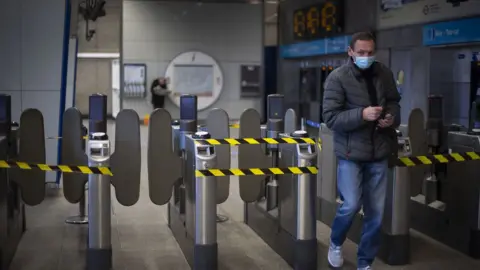 PA Media
PA MediaAs the deadline for a new deal approaches, Mr Byford said he was "almost begging" ministers to send their offer so negotiations could start.
Mr Byford said: "London will grind to a halt - it's as simple as that."
London's Deputy Mayor for Transport, Heidi Alexander, said she wanted a "grown-up discussion" with ministers.
"We do run the risk of this becoming less of a negotiation and more of an exchange of information that then just results in an imposition from government of a whole series of conditions," she warned.
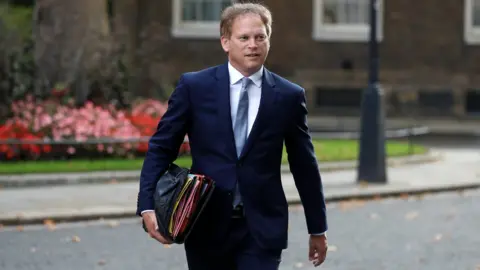 Reuters
ReutersLondon Mayor Sadiq Khan and his team complained of punitive conditions attached to the first grant at the last minute - including extra borrowing, slashing free travel for older people and under 18s and raising fares next year.
TfL's Liquidity Policy means it has to maintain a minimum level of cash reserves of at least 60 days' worth of forecast costs - about £1.2bn - to ensure it has enough cash to meet payment obligations as they become due and provide sufficient headroom to allow it to deal with emergencies.
But Conservative group leader Susan Hall said it was right for ministers to put rules in place when TfL was asking for billions of pounds at taxpayers' expense.
Ms Hall said the network should consider dipping into its £1.2bn reserve.
"It's a hefty sum of money and I've been told it's used for rainy days," she said. "I would suggest it's pouring at the moment."
